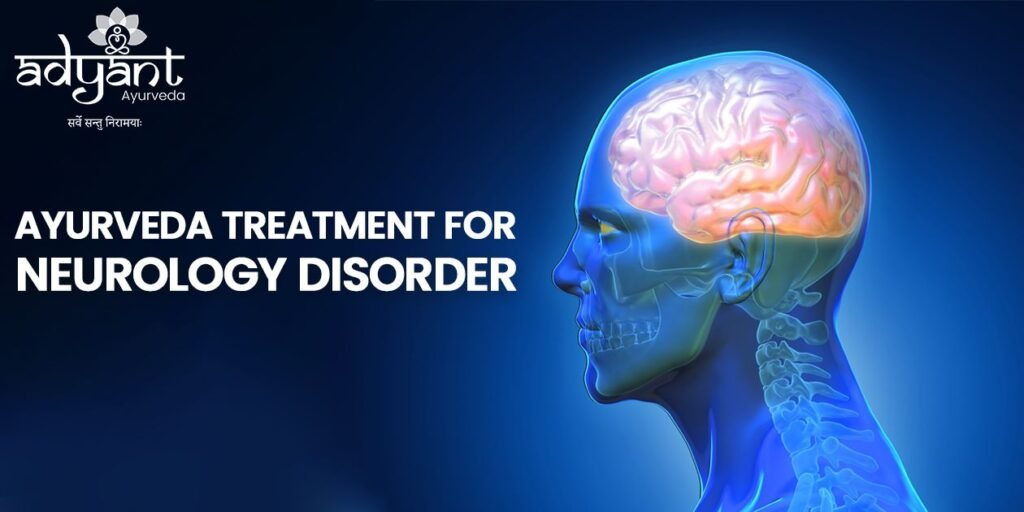Table of Contents
ToggleAyurvedic Treatment for Neurological Disorders: Neurological disorders encompass a wide range of conditions affecting the mind, spine, and nerves that connect them. Ayurveda treatment for Neurological disorder help to promote neurves health.With over 600 identified diseases of the nervous system, including well-known conditions like epilepsy, Parkinson’s disease, and stroke, as well as lesser-known ones like frontotemporal dementia, it is evident that neurological health plays a crucial role in our overall well-being.
Ayurveda, the ancient Indian system of medicine, recognizes the significance of maintaining a balance in the body’s doshas, particularly the Vata dosha, to prevent and address neurological disorders.
Let’s explore Ayurveda’s perspective on neurological issues and the holistic approach taken by Adyant Ayurveda, a leading Ayurveda company, in providing effective treatments.
For a free consultation with top Ayurvedic doctors, download our app from Play Store “AyurCare“
Understanding the Ayurveda’s Perspective on Neurological Disorders Treatment in Ayurveda
In Ayurveda, the ancient Indian system of medicine, the understanding of neurological disorders revolves around the concept of maintaining balance in the body’s doshas, particularly the Vata dosha. The human body is believed to be composed of three doshas – Vata, Pitta, and Kapha – and these doshas need to remain in equilibrium for optimal health. Imbalances in Vata dosha are considered to be a significant contributing factor to the development of neurological disorders.
The Ayurveda perspective emphasizes the role of imbalances in the Majja Dhatu, which refers to the bone marrow and nerve tissues. According to Ayurveda, when the Vata dosha becomes imbalanced, it can affect the functioning of the Majja Dhatu, leading to neurological complications. In addition, imbalances in Pitta and Kapha doshas can also play a role in the manifestation of neurological disorders.
When treating neurological disorders, Ayurveda practitioners take into account the unique aspects of each individual, including their medical history and familial predispositions. This personalized approach allows them to identify the underlying causes of the disorder and create an individualized treatment plan. By addressing the imbalances in the doshas and the Majja Dhatu, Ayurveda treatments aim to restore balance, promote healing, and improve overall neurological well-being.
Also Read: Meet with top ayurvedic doctors in Bangalore
Causes of Neurological Disorders:
Various factors can contribute to the development of neurological disorders. These conditions can arise from a combination of genetic, environmental, and lifestyle factors. Here are some of the common causes of neurological disorders:
- Modern Lifestyles: In today’s fast-paced and stressful world, our modern lifestyles can harm neurological health. Factors such as chronic stress, sedentary behaviour, unhealthy dietary habits, and exposure to environmental pollutants can increase the risk of neurological disorders.
- Genetic Factors: Some neurological disorders have a genetic component. Faulty genes can increase susceptibility to conditions like Huntington’s disease, muscular dystrophy, and certain forms of epilepsy. Genetic predispositions can also interact with environmental factors to trigger the onset of neurological disorders.
- Alcoholism and Drug Abuse: Excessive alcohol consumption and drug abuse can have damaging effects on the nervous system. Prolonged alcohol abuse can lead to conditions such as alcoholic neuropathy and alcoholic dementia. Illicit drug use, particularly drugs that affect brain function, can cause neurological damage and increase the risk of disorders like substance-induced psychosis.
- Medication Side Effects: Certain medications, particularly those used for treating chronic conditions, may have neurological side effects. These can range from mild symptoms like headaches or dizziness to more severe effects such as cognitive impairment or movement disorders.
- Head Injuries: Traumatic brain injuries resulting from accidents or sports-related incidents can cause various neurological problems. Depending on the severity and location of the injury, head trauma can lead to conditions like concussion, post-concussion syndrome, or chronic traumatic encephalopathy.
- Hormonal Imbalances: Hormonal disorders, such as thyroid dysfunction or hormonal fluctuations during menopause, can impact neurological health. Hormonal imbalances can affect neurotransmitter levels, disrupt neural communication, and contribute to symptoms like mood swings, cognitive difficulties, or memory problems.
- Immune System Disorders: Certain autoimmune diseases, like multiple sclerosis, Guillain-Barre Syndrome, and encephalitis, involve the immune system mistakenly attacking the nervous system. These conditions can result in inflammation, demyelination, and nerve damage.
- Infections: Infections that affect the nervous system, such as meningitis or encephalitis, can cause significant neurological complications. These infections can result from bacteria, viruses, or other pathogens that invade the central nervous system, leading to inflammation and damage.
- Vascular Problems: Disorders affecting the blood vessels that supply the brain, such as stroke or cerebral aneurysms, can disrupt blood flow and oxygen supply to the brain. The resulting damage can lead to various neurological symptoms or long-term complications.
Symptoms of Neurological Disorders
Symptoms of neurological disorders can vary widely depending on the specific condition and the part of the nervous system that is affected. It is important to note that experiencing these symptoms does not automatically indicate a neurological disorder, but recognizing them can be crucial for early detection and prompt medical intervention. Here are some common symptoms associated with neurological disorders:
- Persistent or Sudden Headaches: Frequent or severe headaches that persist over time or occur suddenly can be indicative of various neurological conditions. Migraines, tension headaches, cluster headaches, or headaches caused by increased intracranial pressure are examples of neurological disorders that can manifest as head pain.
- Loss of Feeling or Tingling Sensations: Numbness, tingling, or a “pins and needles” sensation in the extremities or other parts of the body can be a sign of nerve damage or compression. Conditions such as peripheral neuropathy, carpal tunnel syndrome, or spinal cord disorders can cause these sensations.
- Weakness or Muscle Loss: Muscle weakness or atrophy can result from neurological disorders affecting the muscles or the nerves that control them. Conditions like muscular dystrophy, myasthenia gravis, or peripheral neuropathy can lead to muscle weakness or wasting.
- Vision Problems: Visual disturbances, including blurred vision, double vision, or difficulty with peripheral vision, may indicate neurological issues. Conditions such as optic neuritis, glaucoma, or damage to the optic nerve can affect vision.
- Memory Loss and Impaired Mental Ability: Memory problems, difficulties with concentration, impaired cognitive function, or changes in behaviour and personality can be associated with neurological disorders like Alzheimer’s disease, dementia, or cognitive impairments resulting from brain injuries.
- Lack of Coordination: Problems with coordination, balance, and motor skills can be observed in various neurological conditions. Conditions like ataxia, Parkinson’s disease, or cerebellar disorders can cause coordination difficulties.
- Muscle Rigidity: Increased muscle tone or stiffness in the muscles can be a symptom of neurological disorders such as Parkinson’s disease or dystonia. Muscle rigidity can affect mobility and cause discomfort.
- Tremors and Seizures: Involuntary shaking or trembling movements (tremors) and seizures can be characteristic of several neurological conditions, including essential tremors, epilepsy, or Parkinson’s disease.
- Back Pain Radiating to Other Body Parts: Radiating pain from the back to other body parts, such as the legs or arms, can be a sign of nerve compression or damage in the spinal cord. Conditions like herniated discs or spinal stenosis can cause such symptoms.
- Slurred Speech: Difficulties with speech production, such as slurred or slow speech, can be indicative of neurological disorders affecting the muscles and nerves responsible for speech. Conditions like stroke, multiple sclerosis, or amyotrophic lateral sclerosis (ALS) can lead to speech problems.
Also Read: Ayurvedic Treatment for Stroke
Therapies Used for Ayurvedic Treatment for Neurological Disorders
Adyant Ayurveda offers a range of Ayurveda treatments for neurological disorders, which are tailored to each individual’s specific needs. These treatments aim to restore balance in the doshas, cleanse the body of toxins, and promote overall well-being. Here are some of the Ayurveda treatments commonly used at Adyant Ayurveda:
- Basti: Basti, also known as Ayurveda enema therapy, involves the administration of herbal oils, decoctions, or medicated ghee into the anal route. This treatment is believed to balance the Vata dosha and nourish the nervous system. Basti therapy can help alleviate symptoms of neurological disorders, improve digestion, and strengthen the body.
- Virechana: Virechana is a detoxification therapy that involves the controlled elimination of toxins from the body through the bowels. This treatment uses purgative substances to remove excess Pitta dosha and toxins accumulated in the liver and gallbladder. Virechana can be beneficial for conditions where Pitta dosha imbalances play a role, such as migraine headaches or liver disorders.
- Shirodhara: It is a deeply relaxing therapy that involves pouring a continuous stream of warm herbal oil onto the forehead. This treatment aims to calm the mind, balance the doshas, and promote relaxation. Shirodhara can be helpful for reducing stress, anxiety, and promoting better sleep, which can benefit individuals with neurological disorders.
- Panchakarma: Panchakarma is a comprehensive Ayurvedic detoxification and rejuvenation therapy that involves a series of treatments tailored to each individual’s needs. It includes therapies like Abhyanga (therapeutic massage), Swedana (herbal steam therapy), Snehana (Internal and external Oileation therapy), and Shirobasti (retaining warm herbal oil on the head). Panchakarma aims to eliminate toxins, balance the doshas, and restore overall health.
- Rasayana Therapy in Neurological Recovery: Rasayana therapies involve rejuvenating formulations and therapies aimed at enhancing tissue regeneration, improving memory and intellect (Medhya Rasayanas), and slowing neurodegeneration.
For better understanding here is the table format for therapies used in Ayurvedic treatment for neurological disorders-
| Therapy | Description |
Purpose & Benefits
|
| Basti (Ayurvedic Enema) | Administration of herbal oils, decoctions, or medicated ghee via rectal route. |
Balances Vata dosha, nourishes the nervous system, improves digestion, strengthens the body.
|
| Virechana (Purgation Therapy) | Controlled elimination of toxins through the bowels using purgative substances. |
Removes excess Pitta dosha; helpful for migraine, liver disorders, and detoxification.
|
| Shirodhara | Continuous stream of warm herbal oil poured on the forehead. |
Calms the mind, reduces stress, anxiety, and promotes better sleep.
|
| Panchakarma | Comprehensive detox program including Abhyanga, Swedana, Snehana, and Shirobasti. |
Eliminates toxins, balances all doshas, rejuvenates the body and nervous system.
|
| Rasayana Therapy | Use of rejuvenating herbs and formulations (e.g., Medhya Rasayanas). |
Enhances tissue regeneration, improves memory, intellect, and slows neurodegeneration.
|
Herbs Used in Ayurveda Treatment for Neurological Disorders
- Ashwagandha (Withania somnifera): Ashwagandha is an adaptogenic herb known for its ability to reduce stress, promote relaxation, and support the nervous system. It is often used in Ayurveda treatments for conditions like anxiety, depression, and cognitive disorders.
- Brahmi (Bacopa monnieri): Brahmi is a renowned herb for enhancing brain function and memory. It is used in Ayurveda to improve cognitive abilities, reduce anxiety, and support overall neurological health.
- Shankhpushpi (Convolvulus pluricaulis): Shankhpushpi is an herb known for its calming properties and its ability to support brain function. It is commonly used in Ayurvedic treatments for conditions like insomnia, anxiety, and memory problems.
- Jatamansi (Nardostachys jatamansi): Jatamansi is a medicinal herb that has calming and neuroprotective properties. It is used in Ayurveda to promote relaxation, improve sleep quality, and support overall neurological well-being.
- Vacha (Acorus calamus): Vacha is an herb known for its nootropic and memory-enhancing effects. It is often used in Ayurveda treatments to improve cognitive function, concentration, and speech-related disorders.
Neurological Disorders Treated at Adyant Ayurveda
At Adyant Ayurveda, we specialize in managing various neurological conditions by combining classical Ayurvedic therapies with modern diagnostic insights. Our treatments are tailored to support nerve regeneration, restore balance in the nervous system, and improve quality of life, naturally and holistically.
Conditions We Treat:
-
Parkinson’s Disease: Ayurvedic therapies help slow the progression of symptoms like tremors, rigidity, and postural instability by nourishing the brain and calming aggravated Vata dosha.
-
Alzheimer’s Disease: Herbal formulations, Nasya therapy, and Rasayana Chikitsa support cognitive function, memory retention, and mental clarity in early to moderate stages of Alzheimer’s.
-
Epilepsy: Seizure control and nervous system balance are achieved using Medhya Rasayanas (nootropic herbs), diet correction, and Panchakarma detox therapies.
-
Multiple Sclerosis (MS): Our integrative approach helps manage symptoms such as fatigue, muscle weakness, and coordination problems, reducing flare-ups and improving daily function.
-
Bell’s Palsy: Therapies like Abhyanga (oil massage), Nadi Sweda (steam therapy), and Nasya (nasal administration of medicated oils) promote nerve recovery and facial muscle tone.
-
Sciatica: Targeted treatments such as Kati Basti, Pizhichil, and herbal pain relievers ease nerve compression, reduce inflammation, and restore mobility.
-
Peripheral Neuropathy: We address symptoms like tingling, numbness, and burning pain through therapies that rejuvenate nerve tissues and improve circulation.
-
Migraine & Chronic Headaches: Shirodhara, Nasya, and customized diet and lifestyle plans help identify triggers, reduce frequency, and manage pain without dependency on painkillers.
-
Stroke Recovery (Post-Paralysis Care): Rehabilitative Panchakarma, physiotherapy, and Ayurvedic nerve tonics assist in regaining lost functions and preventing further neurological damage.
-
Depression, Anxiety & Stress Disorders: Through therapies like Shirodhara, Ashwagandha supplementation, and mental wellness counseling, we address the root causes of psychological distress from an Ayurvedic perspective.
Conclusion: Ayurveda Treatment for Neurological Disorders at Adyant Ayurveda:
Adyant Ayurveda, a renowned Ayurveda company dedicated to neurological disorder treatment, offers comprehensive and effective Ayurveda solutions. The journey towards healing begins with a thorough examination of the patient’s health condition, illness severity, and medical history. The experienced panel of doctors at Adyant Ayurveda carefully evaluates each patient’s unique body composition and physical conditions to develop personalized treatment plans. Depending on individual needs, the duration of treatment, composition of herbal medicines, and dietary regulations may vary.
Neurological disorders may be complex, but Ayurveda offers a time-tested, holistic approach to healing. By balancing the doshas, nourishing the nervous tissues, and addressing root causes rather than symptoms, Ayurvedic therapies can bring relief and improved quality of life for many neurological conditions. At Adyant Ayurveda, our experienced team is committed to helping you restore balance and vitality naturally.
FAQs Related to Neurological Disorders Treatment in Ayurveda
Ques: Can Ayurveda treatment completely cure neurological disorders?
Ans: Ayurveda treatment aims to restore balance and promote healing in the body. While it can provide significant relief from symptoms and improve overall well-being, a complete cure depends on various factors such as the severity of the disorder, individual response to treatment, and adherence to lifestyle changes.
Ques: Are Ayurveda treatments safe for all neurological disorders?
Ans: Ayurveda treatments are generally safe and well-tolerated. However, the suitability of specific treatments may vary depending on the type and stage of the neurological disorder. It is important to consult with a qualified Ayurveda practitioner who can assess your condition and provide appropriate recommendations.
Ques: How long does it take to see results with Ayurveda treatment?
Ans: The duration of treatment and the time required to observe results can vary depending on the individual and the nature of the neurological disorder. Some people may experience improvement within a few weeks, while others may require several months of consistent treatment and lifestyle modifications for noticeable changes.
Ques: Can Ayurveda treatment be used alongside conventional medical treatments?
Ans: Ayurveda treatment can complement conventional medical treatments for neurological disorders. It is essential to inform both your Ayurveda practitioner and allopathic healthcare provider about the treatments you are undergoing to ensure coordination and avoid any potential interactions or contraindications.
Ques: Can Ayurveda help in preventing neurological disorders?
Ans: Ayurveda emphasizes the importance of maintaining overall health and balance in the body. By following Ayurveda lifestyle practices, such as eating a balanced diet, managing stress, and promoting detoxification, you can reduce the risk of various diseases, including neurological disorders. However, individual susceptibility and genetic factors also play a role, and complete prevention cannot be guaranteed.
Ques: Can Ayurveda treatment completely cure neurological disorders?
Ans: While Ayurveda may not claim a complete cure for all neurological disorders, it offers effective long-term management by addressing the root cause, reducing symptoms, and improving the quality of life. With consistent treatment, dietary modifications, and lifestyle adjustments, many patients experience significant improvement.









